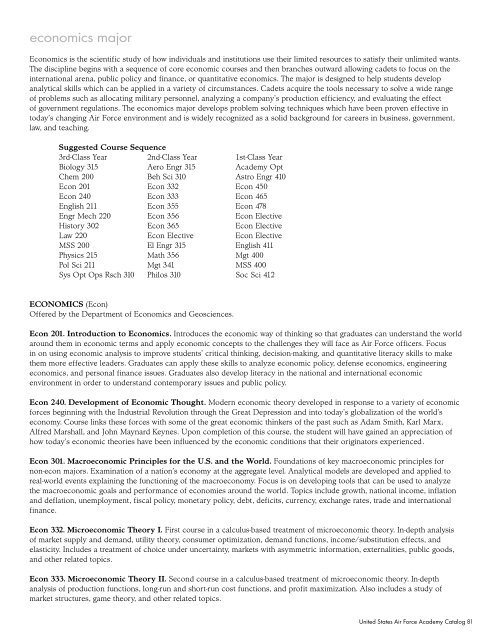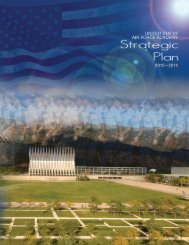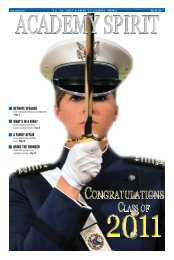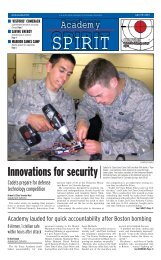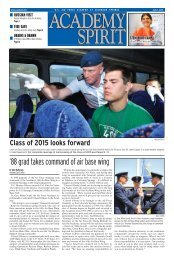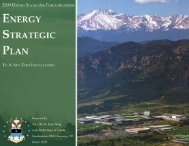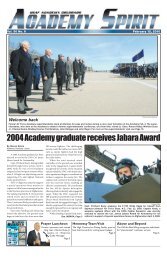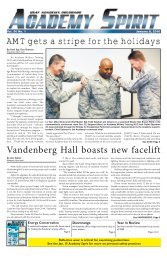2008-2009 Catalog - United States Air Force Academy
2008-2009 Catalog - United States Air Force Academy
2008-2009 Catalog - United States Air Force Academy
You also want an ePaper? Increase the reach of your titles
YUMPU automatically turns print PDFs into web optimized ePapers that Google loves.
economics major<br />
Economics is the scientific study of how individuals and institutions use their limited resources to satisfy their unlimited wants.<br />
The discipline begins with a sequence of core economic courses and then branches outward allowing cadets to focus on the<br />
international arena, public policy and finance, or quantitative economics. The major is designed to help students develop<br />
analytical skills which can be applied in a variety of circumstances. Cadets acquire the tools necessary to solve a wide range<br />
of problems such as allocating military personnel, analyzing a company’s production efficiency, and evaluating the effect<br />
of government regulations. The economics major develops problem solving techniques which have been proven effective in<br />
today’s changing <strong>Air</strong> <strong>Force</strong> environment and is widely recognized as a solid background for careers in business, government,<br />
law, and teaching.<br />
Suggested Course Sequence<br />
3rd-Class Year 2nd-Class Year 1st-Class Year<br />
Biology 315 Aero Engr 315 <strong>Academy</strong> Opt<br />
Chem 200 Beh Sci 310 Astro Engr 410<br />
Econ 201 Econ 332 Econ 450<br />
Econ 240 Econ 333 Econ 465<br />
English 211 Econ 355 Econ 478<br />
Engr Mech 220 Econ 356 Econ Elective<br />
History 302 Econ 365 Econ Elective<br />
Law 220 Econ Elective Econ Elective<br />
MSS 200 El Engr 315 English 411<br />
Physics 215 Math 356 Mgt 400<br />
Pol Sci 211 Mgt 341 MSS 400<br />
Sys Opt Ops Rsch 310 Philos 310 Soc Sci 412<br />
ECONOMICS (Econ)<br />
Offered by the Department of Economics and Geosciences.<br />
Econ 201. Introduction to Economics. Introduces the economic way of thinking so that graduates can understand the world<br />
around them in economic terms and apply economic concepts to the challenges they will face as <strong>Air</strong> <strong>Force</strong> officers. Focus<br />
in on using economic analysis to improve students’ critical thinking, decision-making, and quantitative literacy skills to make<br />
them more effective leaders. Graduates can apply these skills to analyze economic policy, defense economics, engineering<br />
economics, and personal finance issues. Graduates also develop literacy in the national and international economic<br />
environment in order to understand contemporary issues and public policy.<br />
Econ 240. Development of Economic Thought. Modern economic theory developed in response to a variety of economic<br />
forces beginning with the Industrial Revolution through the Great Depression and into today’s globalization of the world’s<br />
economy. Course links these forces with some of the great economic thinkers of the past such as Adam Smith, Karl Marx,<br />
Alfred Marshall, and John Maynard Keynes. Upon completion of this course, the student will have gained an appreciation of<br />
how today’s economic theories have been influenced by the economic conditions that their originators experienced.<br />
Econ 301. Macroeconomic Principles for the U.S. and the World. Foundations of key macroeconomic principles for<br />
non-econ majors. Examination of a nation’s economy at the aggregate level. Analytical models are developed and applied to<br />
real-world events explaining the functioning of the macroeconomy. Focus is on developing tools that can be used to analyze<br />
the macroeconomic goals and performance of economies around the world. Topics include growth, national income, inflation<br />
and deflation, unemployment, fiscal policy, monetary policy, debt, deficits, currency, exchange rates, trade and international<br />
finance.<br />
Econ 332. Microeconomic Theory I. First course in a calculus-based treatment of microeconomic theory. In-depth analysis<br />
of market supply and demand, utility theory, consumer optimization, demand functions, income/substitution effects, and<br />
elasticity. Includes a treatment of choice under uncertainty, markets with asymmetric information, externalities, public goods,<br />
and other related topics.<br />
Econ 333. Microeconomic Theory II. Second course in a calculus-based treatment of microeconomic theory. In-depth<br />
analysis of production functions, long-run and short-run cost functions, and profit maximization. Also includes a study of<br />
market structures, game theory, and other related topics.<br />
<strong>United</strong> <strong>States</strong> <strong>Air</strong> <strong>Force</strong> <strong>Academy</strong> <strong>Catalog</strong> 81


